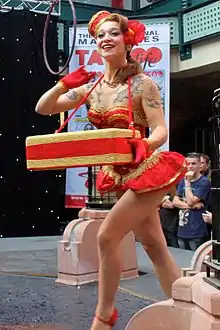Cigarette girl
In Europe and the United States, a cigarette girl is a person who sells or provides cigarettes from a tray held by a neck strap. They may also carry cigars and other items like candy, snacks, and chewing gum on their trays.
.jpg.webp)

Uniform
The most common uniform is a red and black short saloon-style skirt above the knee dress accompanied with a matching pillbox hat,[1] but different colors and styles are possible. Another title for a cigarette girl is candy girls.
Aside from serving cigarettes and other novelties, the attractive girls acted as eye candy and were often employed to flirt with male customers as well.[1] Cigarette girls usually consented in the hopes of getting tips from wealthy businessmen.[1]
Popularity and decline
The modern image of cigarette girl developed in the 1920s with the urbanization of America.[1] Though largely not seen other than in speakeasies and supper clubs,[1] cigarette girls were frequently shown in Hollywood films and soon became well-established among the general public.[1] The cigarette girl of the nightclub became a staple figure of film and theatre.[2]
With the repeal of Prohibition in 1933, speakeasies across America closed and cigarettes girls soon found employment in more popular business destinations.[1]
Cigarette girls were a common sight in restaurants, clubs, bars, airports, and casinos in the 1930s and 1940s in the United States.[1] From the end of World War II to the 1950s, cigarette girls further expanded into sporting events and the lobbies of theaters and music halls during intermissions.[1]
With the rise of cigarette machines in the mid-1950s, however, venue owners no longer needed to seek out cigarette girls who worked for a paycheck, and the girls largely vanished from the public eye.[1] There are still some casinos and nightclubs that still use cigarette girls today, especially in the Las Vegas Strip.[1][3]
In popular culture
- The 1924 Russian film Papirosnitsa ot Mosselproma (The Cigarette Girl from Mossel'prom), by Yuri Zheliabuzhsky (1888–1955), features a heroine who works as a street-corner vendor.[4]
- In 1954’s White Christmas, cigarette girls can be seen throughout the scene set at the fictional New York City Carousel Club.
- In 1988’s Who Framed Roger Rabbit, Betty Boop is shown working as a cigarette girl at The Ink and Paint Club.
See also
References
| Wikimedia Commons has media related to Cigarette girl. |
- "History of the Cigar Girl". famous-smoke.com. Retrieved May 2, 2014.
- Nathan, George J.; Angoff, Charles (1974). The Theatre Book of the Year, 1945–1946. p. 148.
All the boys and girls, along with the old night club setting, are again in evidence: the dumb-cluck minor mobster, the love-lorn cigarette girl in the abbreviated costume, the oily head-waiter, the imperturbable night club boss....
- Stieg, Bill (10 March 1988). "Cigarette girls bring back romantic flavors". The Hour. Norwalk, Connecticut. p. 2. Retrieved 10 September 2013.
- Beumers, Birgit (2009). A History of Russian Cinema. p. 63.